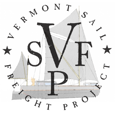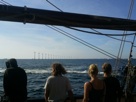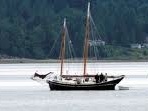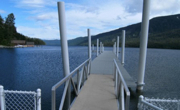Sail Transport
Editor's introduction: This analysis deftly reveals how our cities physically and culturally changed to accommodate commerce, technology and economies of scale to the detriment of communities' livelihoods. Alice Friedemann spent many years in the shipping business (ships), and since retirement has ratcheted up her critique of the corporate economy's distribution system as she explores peak oil. Her previous articles have focused on "Peak Soil", and the "Financial Monsters" we face as economic reality catches up with endless growth.- Jan Lundberg Book Review: Mark Levinson: The Box. How the Shipping Container Made the World Smaller and the World Economy Bigger. Princeton University Press, 2006.Mark Levinson has written a book that shows how containers made global trade possible. In the preface of the paperback edition, he notes other aspects of containerization he became aware of later, such as the potential for containers to harbor atomic weapons, how they’ve become homes, and so on. To me, what Levinson leaves out is how this global distribution system will make it very difficult to go back to local production as energy declines. He doesn’t mention that containerization was the fastest way yet for capitalism to loot the planet and strip Mother Earth down to her hard dry skin. |
|||
-- a voice in Berlin with an update on the new age of sail What a place, what a time: Berlin's transition from a hard winter to a welcome summer. No time for springtime; we've all arrived at the global warming cook off. Who wants to contemplate such a thing? Yet, posing that question has a purpose here, to tell of progress on Culture Change's sail transport transition. The backdrop of Berlin is significant as a unique city of keen interest to those involved in social change and who are chafing in more stressful urban scenes. |
|||
 How a group of farmers, high school students, and community Imagine boarding a flat-bottomed sailing barge for a 300-mile voyage from the shores of Lake Champlain to New York harbor. The hold is laden with twelve tons of locally produced wheat, flour, dry beans, maple syrup, apples, cabbages, and hard cider. This is not a historic re-enactment. This is the future! |
|||
 Sailing wine Holland-Denmark
Here's the good word for you on the progression of Culture Change: Our work is zeroing in on an historic contribution to global infrastructure change. I believe you'll have a clear idea on why you should support it, if you don't already. (You can do it by here: donating here) You recall how we saved healthy land with our campaign for a road building moratorium for over a decade, and educated the public. In the past few years you've noticed our growing emphasis on sail transport. |
|||
 The last month has seen exciting U.S. sail-transport developments. Three encouraging events indicate that the nation may no longer be falling behind Europe in nurturing a critical form of renewable energy. In northern Europe at least four well-established players are operating on a significant scale, and preparing to build more ships. Previous reports this summer on SailTransportNetwork.com have discussed these entities' exciting voyages and plans for new vessels. |
|||
 windmills outside Copenhagen
Reflections on a successful delivery of 8,000 bottles of wine, Holland to Denmark At this writing, the Tres Hombres schooner-brig is just reaching the Netherlands, on its way back from Copenhagen. I wish I had taken the round trip and remained with my able crew mates, but I had to keep to my sail-transport research schedule by returning to the Mediterranean. |
|||
 Fair Transport is the world's foremost sail cargo company. Its 32-meter ship, the Tres Hombres, has pulled off many a voyage in the past few years to bring rum, cacao and other goods from the Caribbean to northern Europe. Shorter runs have involved France, the UK, Denmark, and the Netherlands. The solid, strong brigantine vessel's home is Den Helder, the naval/ship-building/museum port first envisioned by Napoleon. Now the ship is bound for Copenhagen where a visionary buyer will capitalize on the "green" market for carbon-emission-free wine. |
|||
 Hoyle Hodges founded the new Olympia Schooner Company in the Puget Sound. This year it has instituted delivery of fresh produce as part of a business plan to at least break even with sailing cargo and eventually passengers. The company began as the Mosquito Fleet Sustainable Shipping project at Evergreen State College where Hoyle studied. When we saw his video here at Sail Transport Network central in June, we were inspired to learn more. Here's the interview we conducted: |
|||
In the interests of keeping the show on the road and the doors open, we need you as a supportive reader to help Culture Change cover basic costs in February. Here's why: At Culture Change we aren't giving our readers and supporters a part-time, share-our-feelings service. No, we are full-time activists living a low-consumptive, engaged lifestyle. Cutting-edge projects have been our hallmark: Pedal Power Produce, banning plastic bags, depaving, initiating or participating in protests, the Sail Transport Network (STN), multi-media materials and events, arts, networking nonstop, and more -- |
|||
 On April 19, 2011, five 60-foot boats left Auckland, New Zealand to set off on a year's voyage. Stops have included a sacred Polynesian homeland known as Hawaii, the end of one of the longer legs of a round-the-Pacific tour. A sixth boat had joined at Cook Islands, and a seventh in Tahiti. The crews represent the biggest traditional transport and exchange of Polynesian islanders in modern times. The nearly identical boats are traditional but modern canoes, a catamaran rig called a waka (or vaka |
|||

